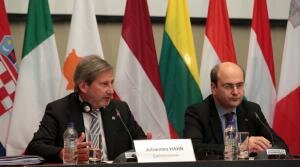- COMPETCompetitiveness (COMPET)
Boosting the competitiveness of SMEs, facilitating their access to financing
Improving the competitiveness of European SMEs and, in particular, facilitating their access to financing was the focal point of discussions at the Informal Meeting of EU Ministers responsible for Cohesion Policy, which was hosted by the Ministry of Development and Competitiveness in Athens on 24-25 April.
Pierluigi Gilibert, Chief Executive of the European Investment Fund, Jeffrey Anderson, Senior Director for European Affairs and Peter Faross, Secretary General of the European Craft and Small and Medium-sized Enterprises (UEAPME), presented their views on the subject in the course the meeting.
The Council discussed the need to adapt the new NSRF (2014-2020) actions with a view to meeting the needs of SMEs and their individual characteristics (development level, regional and national economic situation etc.), as well as the further utilization of financial instruments to facilitate the access of SMEs to grants, loans, loan guarantees etc. During 2014-2020, funds for SMEs have doubled (from € 70 bn in 2007-2013 to € 140 bn) in order to boost growth and job creation.
What was also highlighted was the need to focus on innovation and its positive impact on SMEs’ productivity, the encouragement of business partnerships on a transnational level so as to enable the expansion of enterprises to new markets and the investment in human resources allowing the SMEs access to highly educated personnel.
Commissioner responsible for Regional Policy, Johannes Hahn, presented the state-of-play in the submission of Partnership Agreements by the Member States (Partnership Agreements have replaced the NSRF, for the programming period 2014-2020) and the operational programmes. According to the latest data, 27 out of 28 official partnership agreements have already been submitted.
One of the topics on the agenda was Urban Development, in keeping with the conclusions of the conference on the “Cities of Tomorrow”, organized by the European Commission in February 2014, in Brussels. Given that the majority of the population in Europe, as well as internationally, resides in urban areas and that more than 50% of Cohesion Funds will be distributed to urban areas, the discussion centred on:
-Better allocation of funds in order to tackle problems arising from urban development (environmental pollution, poverty, social exclusion etc)
-Better cooperation among EU, national and local governments, with a view to addressing urban challenges.
-The prospects for formulating a European Agenda on Urban Development.
Development and Competitiveness Minister, Kostas Hatzidakis, noted “the Informal Meeting of EU Ministers responsible for Cohesion Policy coincides with the beginning of the New Programming Period 2014-2020; it also comes at a time when the economies of the countries severely hit by the crisis are at a turning point on the way to recovery. The adoption of financing programmes for SMEs, tailored to the needs of each country’s economy, especially for those countries that have been affected by the crisis, should be allowed.
It is inconceivable, especially now, to ignore the unique problems faced by SMEs in these countries. Where necessary, we should be prepared to make the changes required in the application of competition rules so as not to further undermine the position of enterprises of weaker countries, to support innovative and outward-looking entrepreneurial ventures with flexible financial products, as well as to maximize the efficiency of community funds.










